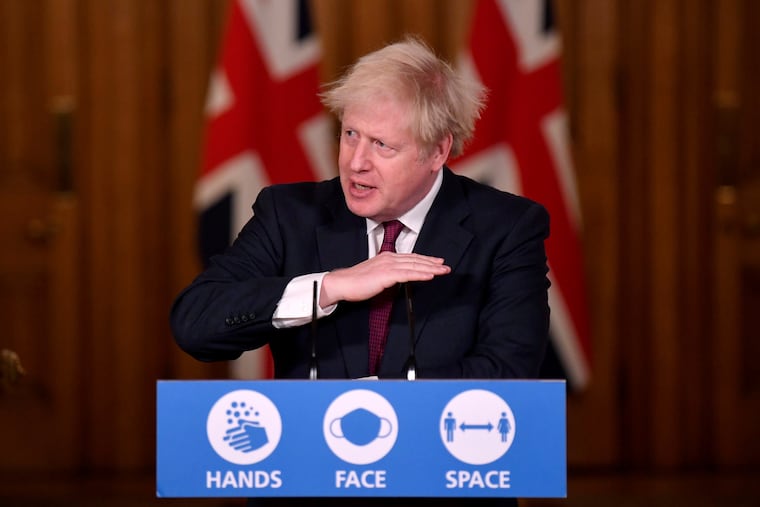Virus mutation with ‘significantly faster’ transmission leads to lockdowns in Britain
Faced with a newly emerging coronavirus mutation with "significantly faster" transmission rates, Britain tightened pandemic restrictions in London and parts of the country.

LONDON - Faced with a newly emerging coronavirus mutation with “significantly faster” transmission rates, Britain on Saturday announced tightened pandemic restrictions that returned London and parts of the country to virtual lockdown and reversed earlier promises for relaxed rules over the holidays.
The new mutation, or variant, was first detected in southeast England in September and is quickly becoming the dominant strain in London and other parts of the country. But experts said it does not appear more deadly or resistant to vaccines.
At a news conference from 10 Downing Street, British Prime Minister Boris Johnson said the new variant "may be up to 70 percent more transmissible."
"This is spreading very fast," he said, announcing international travel bans and other measures for about 18 million people in England beginning Sunday. Wales and Scotland followed with their own tightened restrictions and travel bans.
"We have alerted the World Health Organization and are continuing to analyze the available data," said England's chief medical adviser, Chris Whitty. It was not immediately clear if the new variant had moved beyond Britain.
British chief science adviser, Patrick Vallance, said the "virus has taken off" after being observed for months.
"And it's moving fast and has led to sharp increase in hospitalizations," he said, calling the need for new restrictions a "horrible moment."
He went on, however, to say that the outbreak of the new strain "is controllable and there is light at the end of the tunnel with the vaccinations having started." Britain was the first to approve the new Pfizer/BioNTech vaccine and the first to begin a mass immunization program earlier this month.
» READ MORE: All your COVID-19 vaccine questions, answered
The researchers stressed that this kind of mutation is not surprising. Sharon Peacock, director of the surveillance consortium and a professor of microbiology at the University of Cambridge, said thousands of mutations in the coronavirus have been identified since it emerged.
"The vast number have no impact," she said. "Mutations are a part of natural life."
Many viruses mutate and evolve, becoming more transmissible, but less deadly. But to date, the decline in mortality among infected people during the pandemic has been attributed to improvements in treatments.
Johnson and his government have been fighting to "save Christmas." They put Britain in countrywide lockdown in November, hoping it would slow transmission and allow for a greater relaxation of restrictions for a five-day period during the holidays, to allow families and friends to gather.
Now London and the southeast and east of England will enter the highest level of "Tier 4" restrictions.
That means all nonessential shops will be closed, as will gyms, hair salons, pubs, restaurants and theaters. Travel to and out of the Tier 4 areas will not be allowed. People will be able to meet only one other person from another household in an outdoor space only.
Christmas gatherings of more than one family will be banned in the Tier 4 zone - but permitted for one day in other areas.
"We, of course, bitterly regret the changes," said Johnson.
"When the virus changes its method of attack we as a country have to change our method of defense," he said.
British scientists have been following the spread of the new variant for nearly three months, eventually seeing it in samples taken from more than 1,100 people, most of whom lived in the southeast of England.
The virus trackers briefed reporters from various media, including The Washington Post, earlier this week. The scientists said that the new variant was spreading rapidly, suggesting that it was more infectious, more easily transmitted. But they cautioned there was no evidence to suggest the variant was capable of inflicting more illness or death.
What surprised them was the sudden prevalence of the variant in samples of mucus and saliva taken from patients.
"This lineage came up quite rapidly," said Nick Loman, a professor of microbial genomics at the University of Birmingham.
Peter Openshaw, professor of experimental medicine at Imperial College London, called the British government's data on the new variant "of great concern."
"It is right to take it seriously," he told science journalists on Saturday, noting the "variant does seem about 40 to 70 percent more transmissible."
He said the number of cases could double "just six or seven days" at the current rate.
"So it is really vital that we get this under control," he said.
The prevalence of the new mutation was discovered by U.K. Covid-19 Genomics Consortium, which operates government and university laboratories in Britain to track changes to the virus.
The scientists said thousands of mutations of the cornovirus have been detected in samples taken around the world, and that new lineages arise and then usually disappear.
The new variant showed 17 mutations, most in a segment of the virus's genome that encodes for the spike protein, the protruding structure essential to the pathogen's ability to bind with the receptor cells in a person who gets exposed and then infected.
On Saturday, the chief science adviser updated the changes to the virus, saying there were 23 different mutations.
- - -
The Washington Post’s Joel Achenbach in Washington contributed to this report.